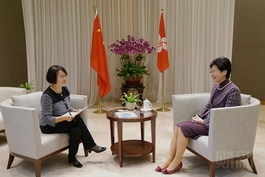Tax Season Revives Debate Over Hong Kong’s Low Rate for Wealthy

The arrival of tax season has reignited debate over whether Hong Kong’s income tax system favors the city’s richest at the expense of its middle-income earners.
Over HK$58.8 billion ($7.49 billion) in income tax was paid to the special administrative region’s government for the year of assessment ending in mid-2016, and nearly three-quarters of this sum came from the pockets of those earning over HK$1 million a year, according to data recently released by the Hong Kong government.
Income tax in Hong Kong is paid at progressive rates of between 2% and 17% below a certain annual salary — around HK$2 million in 2018 — and at a fixed rate of 15% once that threshold is reached. The city’s relatively low maximum income tax rate — compared to maximum rates of 45% and over 39% in the U.K. and the U.S. — has long added to its reputation as a tax haven for wealthy foreigners.
But with income inequality in Hong Kong rising to a 40-year high last year, there have been increasing calls for the city to change its tax system, in order to redistribute wealth more equitably.
Law Chi-kwong, Hong Kong’s secretary for labor and welfare, among other public figures, has advocated abolishing the standard tax rate and requiring the highest earners to pay higher rates. Under the existing system, those earning HK$100 million pay the same rate as those earning HK$2 million.
Lower- and middle-income Hong Kong residents are already being punished by rising property costs, which are essentially a built-in tax on all residents, regardless of income, argued Wang Xiping, an economist at Xiamen University.
Public sentiment also favors a reform of Hong Kong’s tax system. A 2017 study by Hong Kong University researchers found that 70% of residents agreed that the city’s government should raise tax rates for high net-worth individuals, in order to reduce inequality.
However, some still believe in keeping the status quo. Hong Kong’s current tax system is simple and reasonable, and is also an important factor attracting talent to the city, Deloitte Tax Director Ellen Tong told Caixin.
“Simply adjusting the income tax rate will not shrink the wealth gap,” Tong said.
Contact reporter Teng Jing Xuan (jingxuanteng@caixin.com)

- 1Cover Story: China Carves Out a Narrow Path for Offshore Asset Tokenization
- 2Drownings Shake Chinese Enthusiasm for Travel to Russia
- 3Over Half of China’s Provinces Cut Revenue Targets
- 4Li Ka-Shing’s Port Empire Hit by Forced Takeover Amid Panama Legal Dispute
- 5In Depth: China’s Mutual Fund Industry Faces Overhaul After a Banner 2025
- 1Power To The People: Pintec Serves A Booming Consumer Class
- 2Largest hotel group in Europe accepts UnionPay
- 3UnionPay mobile QuickPass debuts in Hong Kong
- 4UnionPay International launches premium catering privilege U Dining Collection
- 5UnionPay International’s U Plan has covered over 1600 stores overseas





